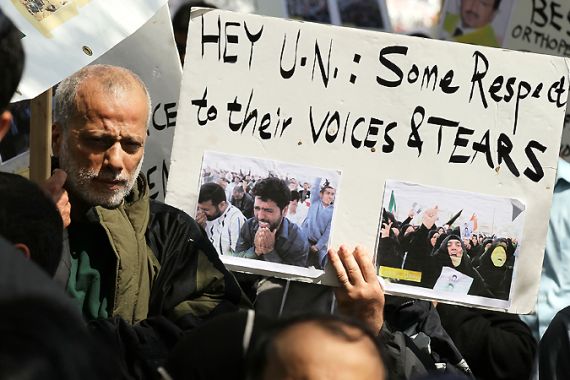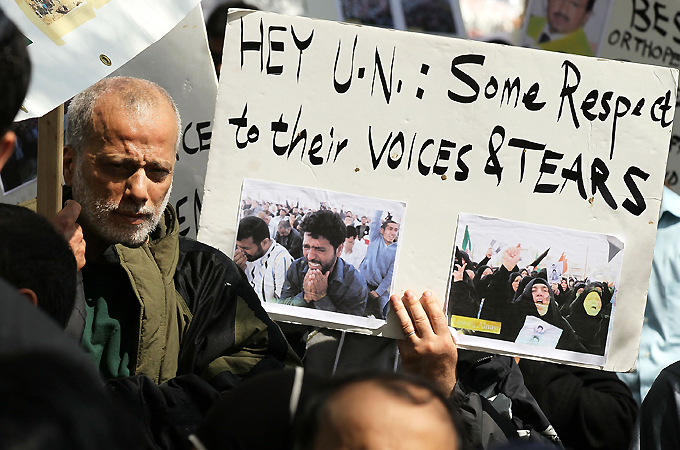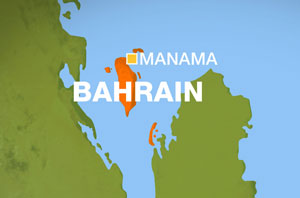Bahrain denies mass sackings over protests
Official says “no one has been dismissed for disciplinary reasons” as ILO team visits kingdom to express concerns.

 |
| Protests have been held abroad in solidarity with the demonstrations in Bahrain [GALLO/GETTY] |
The head of Bahrain’s civil service has denied that any employees were sacked after the largely Shia pro-democracy protests that the Gulf Arab kingdom crushed last month with military reinforcements from some of its neighbours.
Bahraini opposition groups and rights organisations say hundreds of public employees were dismissed on the grounds that they took part in protests. The government argues it had taken steps only against those who committed crimes during the protests.
“Up to now, no one has been dismissed for disciplinary reasons,” state media quoted Ahmad bin Zayed al-Zayed, the head of the civil service, as saying.
He said further that any disciplinary measures for alleged involvement in the uprising would be for strictly defined administrative and criminal offences.
In comments reported late on Tuesday on Bahrain’s state news agency, al-Zayed denied “what has been said about the dismissal of a number of employees … in positions under the umbrella of the civil service”.
Bahrain, which hosts the Fifth Fleet of the US navy, has a free trade pact with the US which the AFL-CIO trade union confederation last week urged the US to pull out of in response to violations of human and labour rights by Bahrain.
The International Labour Organisation (ILO), a specialised agency of the UN that deals with labour issues, has sent a team to Bahrain to share its concerns with high-level government officials, a spokesperson told Al Jazeera.
The representatives were due to meet members of the government, trade unionists and employer representatives on Wednesday and Thursday to discuss the dismissals of trade unionists alleged to have participated in recent demonstrations.
They were also expected to raise the issue of judicial actions taken by the government against the General Federation of Bahraini Trade Unions.
Bahraini unionists called strikes in solidarity with the Pearl Roundabout protests in February.
Dragged from workplace
The Bahrain Centre for Human Rights (BCHR), an opposition group central to the recent Shia-led anti-government protests, put the number of detainees at 817.
The figure included 71 women – in a clear breach of tradition in the conservative Muslim Gulf region, where women embody the honour of a family.
“This is a new phenomenon in Bahrain,” Nabil Rajab, the head of the BCHR, said.
One woman who spoke to the AFP news agency said she was threatened with rape if she did not confess to taking part in protests.
“You’d better confess. Otherwise, I’d take you to the other interrogation room where men would make you talk,” she said, quoting an officer’s threat.
 |
| Country profile: Bahrain |
The woman said she was dragged from her workplace along with other Shia Muslim colleagues. In the bus to the police station, policewomen slapped their faces and made them chant pro-monarchy slogans, she said.
Bahrain is ruled by the Sunni Muslim Al-Khalifa family.
She asked for details of her job not to be disclosed because police warned those arrested not to talk about their ordeal while in custody.
The woman said she eventually confessed to taking part in demonstrations at Pearl Square, the epicentre of the anti-regime protests, and also to protesting at work.
She said she shared a cell with several doctors, nurses and teachers. While being released, she said she saw teenage female students being dragged into a police station and beaten mercilessly by policewomen.
“They used to punish us psychologically by opening a door leading to the men’s section of the police station so we could see them being beaten. We would hear their screams under torture,” she said.
Shia targeted
Although security forces showed restraint in driving protesters from Pearl Square, the authorities later unleashed police on Shia dissidents nationwide.
“We can call this now a regime of sectarian separation that is working on a sectarian purge” of Shia, Rajab charged, citing raids on schools and medical centres during which Shia Muslims were ordered to line up separately from Sunnis.
Mattar Ibrahim Mattar, who quit parliament along with 17 other MPs in Wefaq, a Shia opposition group, in February in protest at violence against protesters, also spoke of Shia employees being sacked if they were suspected of having taken part in demonstrations.
“Police raid medical centres and separate employees based on their sects, then order Shias to stand by the wall and put their arms up … while masked informers point out” those who joined the protests, he said.
More than 1,000 Shia employees had been fired, he said.
The government has admitted to dismissing some workers. On Tuesday, the health ministry said it had referred for prosecution 30 employees among those suspended because of “recent events”, after an investigation found that they committed acts that “appeared criminal”.
Even sports professionals were targeted. An investigatory committee has suspended 150 players, coaches and staff over their alleged involvement in protests.
Meanwhile, the authorities have demolished many Shia places of prayer and old mosques, saying they were built without authorisation.
“Ten mosques were demolished during one night in the village of Nuwaidrat,” Mattar said. He said that some were very old and built before the system of building permits even existed.
Sheikh Khaled bin Ali Al-Khalifa, Bahrain’s justice and Islamic affairs minister, has dismissed claims of mosques being demolished, saying in a statement on Friday that only “encroachments” were removed.
“This is being done to appease the Sunni Salafist groups that hate the Shia, and who are allied” with the authorities, Rajab of the BCHR said, alleging that the government aims to turn the pro-democracy uprising into a sectarian conflict.